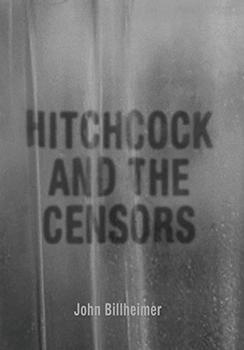
Critics' Opinion:
Readers' rating:
Published Jun 2019
384 pages
Genre: Biography/Memoir
Publication Information
John Billheimer traces the forces that led to the Production Code and describes Hitchcock's interactions with code officials as he fought to protect his creations.
Throughout his career, Alfred Hitchcock had to deal with a wide variety of censors attuned to the slightest suggestion of sexual innuendo, undue violence, toilet humor, religious disrespect, and all forms of indecency, real or imagined. From 1934 to 1968, the Motion Picture Production Code Office controlled the content and final cut on all films made and distributed in the United States. Code officials protected sensitive ears from standard four-letter words, as well as a few five-letter words like tramp and six-letter words like cripes. They also scrubbed "excessively lustful" kissing from the screen and ensured that no criminal went unpunished.
During their review of Hitchcock's films, the censors demanded an average of 22.5 changes, ranging from the mundane to the mind-boggling, on each of his American films. Code reviewers dictated the ending of Rebecca (1940), absolved Cary Grant of guilt in Suspicion (1941), edited Cole Porter's lyrics in Stage Fright (1950), decided which shades should be drawn in Rear Window (1954), and shortened the shower scene in Psycho (1960).
In Hitchcock and the Censors, author John Billheimer traces the forces that led to the Production Code and describes Hitchcock's interactions with code officials on a film-by-film basis as he fought to protect his creations, bargaining with code reviewers and sidestepping censorship to produce a lifetime of memorable films. Despite the often-arbitrary decisions of the code board, Hitchcock still managed to push the boundaries of sex and violence permitted in films by charming―and occasionally tricking―the censors and by swapping off bits of dialogue, plot points, and individual shots (some of which had been deliberately inserted as trading chips) to protect cherished scenes and images. By examining Hitchcock's priorities in dealing with the censors, this work highlights the director's theories of suspense as well as his magician-like touch when negotiating with code officials.
"Alfred Hitchcock pushed the boundaries of onscreen permissiveness as much as any artist/entertainer of the twentieth century. John Billheimer meticulously catalogs the filmmaker's battles with the censors, both mischievous and profound, in fantastically readable fashion. A vital and fun addition to Hitchcock scholarship." - Eddie Muller, author, Film Noir Foundation founder, and Turner Classic Movies Host
"Many Hitchcock books and articles include accounts of censorship, and many books and articles on censorship include material on Hitchcock films. I don't know of any other work that brings the man and the topic together in as businesslike a way as is done in Hitchcock and the Censors. It is an attractive study that offers a valuable, fresh angle on Hitchcock's career." - Charles Barr, coauthor of Hitchcock Lost and Found: The Forgotten Films
"A meticulous deep dive into the sweaty tango between Hitchcock and the Code. Amazing to witness how arbitrary and stringent the rules were and the resulting sacrifices movies had to make. Hitchcock rose to the challenge and made the debates part of his expression―but what a bloody tiresome waste of his time." - Darren Aronofsky
"Here is a book that should have (and could have) been written years ago...Each movie has a history all its own, and while passing reference has been made to censorship in other studies of Hitchcock, this is the first comprehensive book on the subject. No more be said: this is by definition an important piece of work." - Leonard Maltin
"Throughout his career, Alfred Hitchcock battled governmental and industry censors of his films. These struggles are alluded to in many of the biographies and critical studies of this most written about of film directors, but Billheimer's is the first to concentrate on issues of censorship, including a general history of its occurrence from the beginning of the motion picture industry." - Mystery Scene Magazine
This information about Hitchcock and the Censors was first featured
in "The BookBrowse Review" - BookBrowse's membership magazine, and in our weekly "Publishing This Week" newsletter. Publication information is for the USA, and (unless stated otherwise) represents the first print edition. The reviews are necessarily limited to those that were available to us ahead of publication. If you are the publisher or author and feel that they do not properly reflect the range of media opinion now available, send us a message with the mainstream reviews that you would like to see added.
Any "Author Information" displayed below reflects the author's biography at the time this particular book was published.
John Billheimer is the author of two mystery series; one with West Virginia failure analyst Owen Allison, and the other featuring Ohio sportswriter Lloyd Keaton. He has taught courses in film noir, hard-boiled fiction on film, and the modern mystery in film and print at Stanford and Santa Clara Universities.





The Funeral Cryer by Wenyan Lu
Debut novelist Wenyan Lu brings us this witty yet profound story about one woman's midlife reawakening in contemporary rural China.
Your guide toexceptional books
BookBrowse seeks out and recommends the best in contemporary fiction and nonfiction—books that not only engage and entertain but also deepen our understanding of ourselves and the world around us.